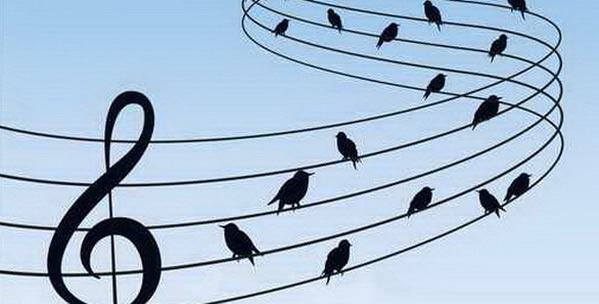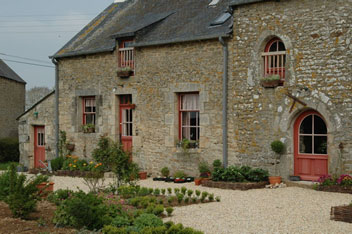N°22 |
 |
2013/2014 |
ONE-TO-ONE COURSES WHERE THE LANGUAGE IS SPOKEN |
||
|
||
At school, and in most language schools, learning a language is primarily studying its grammar. Can we allow this premise? And if grammar seems vital to you, which type do you need, the type that would allow you to learn a foreign language very quickly? |
||
This would be like a musician writing his score before hearing the music that he is creating! He first receives or constructs a melody in his head, then, although this is not a must, he rewrites it in the form of signs, musical notes. It is not done the other way round. We all know people who can write music without being able to write a single note, who 'play by ear', not to mention jazz musicians or African drummers. |
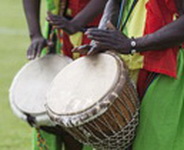 |
|
The same goes for languages. We express ourselves in our mother tongue without thinking about grammatical rules. There are many of us who do not even know the grammar of our own language. Wanting to first learn the notes in music or the grammar in a language is putting the cart before the horse. |
||
| HOW VITAL IS GRAMMAR? | ||

|
Can you not learn a language without knowing its grammar? How did you learn your mother tongue? Without grammar. You learned the grammatical rules at school when you could already speak. Grammar in class is a little similar to Pure Mathematics at school. Grammatical analysis is like solving maths problems and conjugations are like mental arithmetic. Mastering grammatical rules helps us to write better, not to speak better. On the contrary, having to follow rules removes all that is natural and delays assimilation. To speak fluently and naturally, one must never rely on grammar. |
|
We often forget that grammatical rules, like musical rules, were written down afterwards and they had one aim: explaining the communication rather than facilitating it. Furthermore, as with music, they are not really the norms, and often include numerous exceptions. Music scores and grammar are buoys. It is best to learn to swim without depending on them. |
||
Spending time learning grammar gives us a feeling of security. If the rules describe the usage that you already master, you will be comforted. If they deal with usages that you do not know, put them in sentences that are meaningful to you. By repeating these sentences, you will naturally assimilate these rules. It is only on this condition that grammar will not be crippling and will not alter your expression. |
||
|
||
If, nevertheless, you are tempted by grammatical adventures, in order to save precious time, choose a type of grammar that is close enough to your mother tongue and start with the structures that you already know. At DialoguE, if you wish to improve your knowledge of grammar, your teacher will help you efficiently in this process. You will have the pleasure of discovering a fully personalised and practical grammar that will meet your needs. |
||
| WHICH GRAMMAR TO LEARN? | ||
While traditional grammar is hardly useful for speaking, and while music theory does not help us to create music, there are other types of 'grammar'. To write music, you can manage without the score sheet, but you cannot manage without rhythm, melody or harmony. The same applies to languages. It is that type of 'grammar' that is vital. If you keep to the rhythm, stress and harmonic rules of your mother tongue, and if you do not let go of its melody to replace it with the highs and the frequencies of the language that you are learning, the people you are speaking to will find it hard to understand you, if at all. |
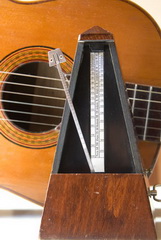 |
|
In a foreign language, without this type of 'grammar', the richness of your vocabulary and the perfection of your grammatical structures will be of little use to you. A DialoguE trainer 'knows the music'. In one week, you will pick up or perfect the appropriate way of speaking the language that you are learning. In one week, you will learn or master these musical elements that will enable you to be understood by native speakers and to understand them. How? By repeating sentences that will allow you to naturally assimilate the grammatical structures that are useful at your level. Isn't learning the grammar without being aware of it a bit of a dream? |
||
 |
GEMMA ARTERTON (HANSEL & GRETEL, QUANTUM OF SOLACE...) LEARNED FRENCH AT DIALOGUE-FRANCE (video) |
|
| YOUR DAY AT DIALOGUE (video) |
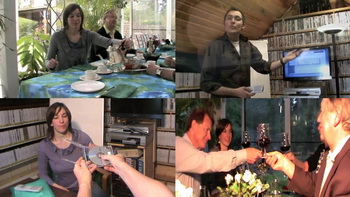 |
|
 |
DIALOGUE TV REPORT (video) |
|
|
||
YOUR VIDEO TESTIMONIALS (testimonials of Dialogue's students) |
||
| DIALOGUE-FRANCE REPORT | ||
 |
||
| THE DIALOGUE TEAM |
||
DialoguE IdiomaS info@dialogue.es |
Richard van Egdom richard@dialogue.com |
Minoo & Mike Short dialogue@angloscene.com |
DIALOGUE IDIOMAS BARCELONA |
DIALOGUE TALEN SINT-PIETERS-LEEUW |
DIALOGUE-ANGLOSCENE RYE (HASTINGS)
|
Claudine & Jean-Luc Godard info@dialogue.com |
Véronique & Bernard Hénusse info@dialogue-france.com |
|
DIALOGUE_LANGUAGES HEAD OFFICE - SPA |
||
DIALOGUE BELGIUM Spa |
DIALOGUE FRANCE Brittany |
|
What you will certainly not find elsewhere
Journal
DialoguE

"ONE OF THE BEST LANGUAGE SCHOOLS"
( WALL STREET JOURNAL)
